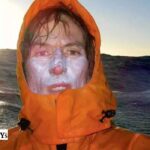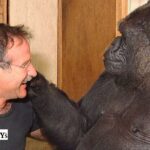There are various controversial ancient texts that hint at the interaction between humans and the beings that arrived on Earth from another place. Although there is no definite evidence to support this theory, many credible personalities have given credence to it. In the midst of this, there are two ancient books that discuss aliens, UFOs, and life on other planets. This evidence clearly states that humans believed in the existence of aliens for thousands of years.
Ancient Novel About Aliens, UFOs, and Robots Written in the 2nd Century
Lucian of Samosata, a Syrian satirist and rhetorician, is credited with introducing the world to science fiction almost 2,000 years before Jules Verne and H.G. Wells. As one of the earliest novelists in Western Civilization, he envisioned a future where humankind would encounter alien life, engage in interplanetary warfare, and create artificial life.
Lucian covered topics such as extraterrestrials, spaceships, and robots in the Greek language long before the works of Verne and Wells. Many scholars consider him to be the father of science fiction, as his stories laid the groundwork for the genre as we know it today, even though they were written two millennia ago.
In his novel “A True Story,” Lucian narrates the adventures of Lucian and his crew, all of who were cosmonauts, flying ships, television projections, talking machines, artificial intelligence, encounters with aliens, space battles, UFOs, humanoids, as well as cities erected inside a living organism.
Lucian’s work, written centuries ago, foreshadowed many contemporary science fiction motifs. Lucian and his fellow travelers embark on their journey beyond the Pillars of Heracles, but their plans are disrupted by a fierce storm that blows them off course. Eventually, they arrive at an island with a remarkable river of wine that is teeming with fish and bears. Despite the island’s wonders, they do not stay long and continue on their way, only to be swept up by a powerful whirlwind that carries them all the way to the moon.
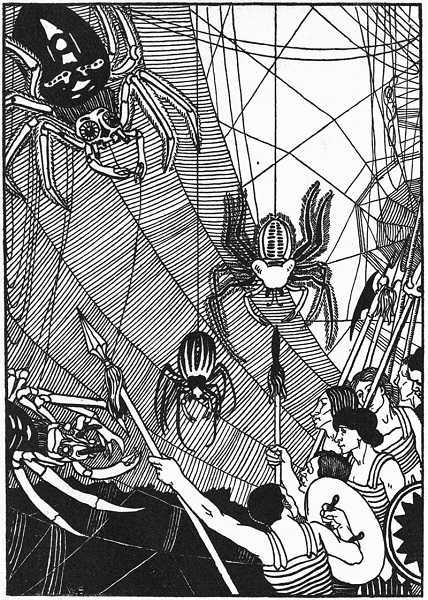
They arrive in the midst of a conflict between the rulers of the moon and sun, battling for control over the “Morning Star.” The armies are comprised of hybrid creatures, part mechanical and part biological, with strange forms. The Sun army prevails, leading to a treaty of peace. Lucian provides insight into the disparities between life on Earth and the other planets.
Upon their return to Earth, Lucian and his travelers are engulfed by a colossal whale spanning 200 miles. Inside, they discover a diverse population of fish people.
After engaging in a war with enigmatic creatures, they eventually triumph over the whale after starting a bonfire within its body. Finally, they succeed in unlocking its jaws and making a daring escape. As they continue on their voyage, they chance upon a colossal oceanic abyss but manage to navigate its edge, leading to the discovery of a distant continent that they decide to explore.
Lucian abruptly concludes his writing by indicating that their forthcoming adventures will be chronicled in the following sequels, all of which remained unpublished. In addition, Lucian’s work encompasses tales of incredible shipwrecks and voyages to extraordinary lands, such as an island of dreams, and wondrously traversing through interstellar forests and landscapes.
Read also:
- Filmmaker Corbell On Active UFO Shootings By Militaries: It’s No One’s Technology
- Massive Objects Detected by SpaceX & Elon Musk Shocking Comment on UFO Shootings By US
- Discovered 2-Min Footage Of ‘Phoenix Lights’ & Arizona Man Who Filmed Huge Solid UFO Vanished
- US Govt. Insider Contacts Neuroscientist And Tells Him ‘UFOs Are Non-Human Intelligence’
Being the first writer to distinguish between reality and fiction, Lucian made a significant contribution to literature, albeit not a widely recognized one in his time. Moreover, “A True Story” is an early example of the idea of traveling across the Atlantic Ocean and the exploration of unknown lands, predating Columbus’s journey by approximately 1,400 years.
Rare 17th-century book on alien life discovered
Due to the hard work of books valuer Jim Spencer, there is a discovered book about what life might be like on other planets, entitled “The Celestial World Discover’d: Or, Conjectures Concerning the Inhabitants, Plants and Productions of the Worlds in the Planets” by Christiaan Huygens. Spencer found the book at a free antique valuation event in Gloucestershire, UK. Published in 1698, the book offers a unique view of how people of the time perceived the possibility of extraterrestrial life.
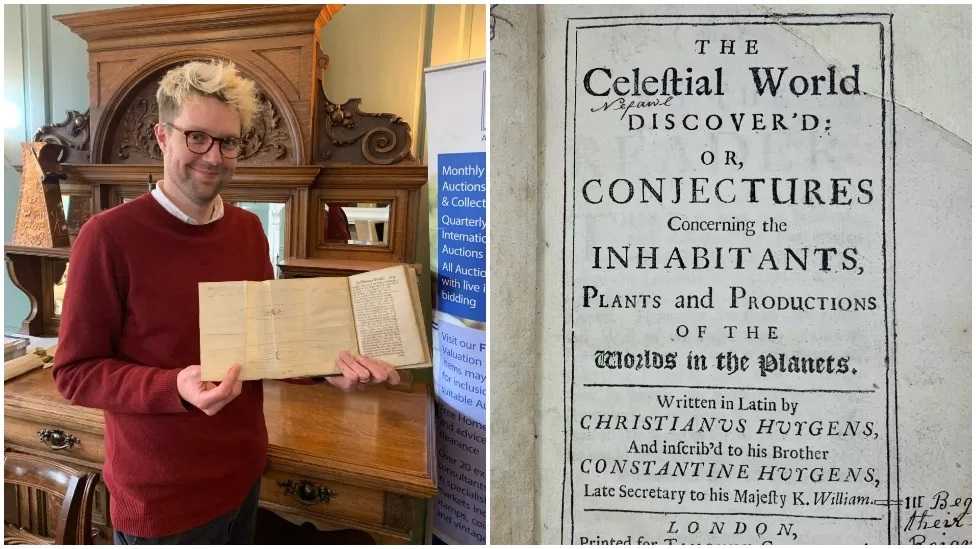
Christiaan Huygens, a prominent Dutch scientist who excelled in the fields of astronomy, mathematics, physics, and invention, is renowned as one of the greatest scientists of all time. In addition to his pioneering work on the pendulum clock, the wave theory of light, and the discovery of the true shape of Saturn’s rings, it has been revealed that Huygens believed in the existence of extraterrestrial life, as evidenced by a rare book recently unearthed.
The book, which includes five folding plates, presents Huygens’ argument that it is unlikely that God would have created other planets solely to be observed from Earth, suggesting that there must be a greater purpose. Spencer commented on the discovery in a statement:
“It’s fascinating to think who turned these pages in 1698, what they must’ve felt when reading these descriptions of life on Jupiter or Saturn before gazing up at the night sky. The book tries to describe what extraterrestrial beings might look like, how they spend their time, even what their music sounds like. It seems almost comical, but it’s informed by scientific reasoning, and who knows how our own thoughts on these matters will appear to people looking back in 324 years.” (Source)
Such weird and wonderful musings include Huygens concluding aliens must have hands and feet, writing in the book:
“Aliens must have hands and feet like humans because of their “convenience,” writing: “What could we invent or imagine that could be so exactly accommodated to all the design’d uses as the Hands are? Shall we give them an Elephant’s Proboscis.”
And that “‘celestial beings’ must have feet ‘[unless] they have found out the art of flying in some of those Worlds.’” Not to mention that Huygens believed: “aliens enjoyed astronomy and observation, sailed boats and listened to music” but also suffered misfortunes, wars, afflictions and poverty “because that’s what leads us to invention and progress. Aliens! Who sail boats and listen to tunes! They’re just like us.”
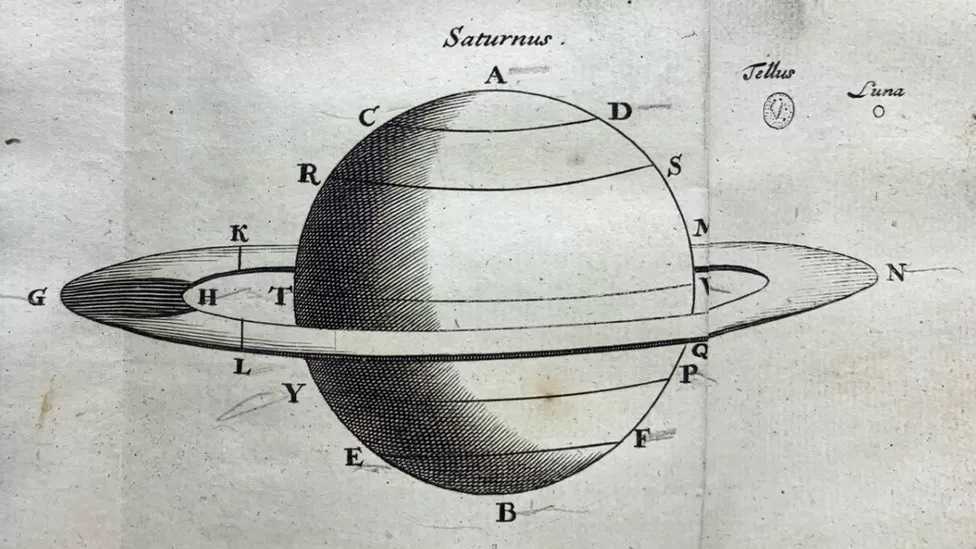
Huygens shared the belief that aliens, just like humans, must experience difficulties in order to drive innovation and advancement. “If Men were to lead their whole Lives in an undisturb’d continual Peace, in no fear of Poverty, no danger of War, I don’t doubt they would live little better than Brutes, without all knowledge or enjoyment of those Advantages that make our Lives pass on with pleasure and profit.”
Although some of Huygens’ conclusions may seem absurd to modern readers, Spencer finds the book captivating because of the many unanswered questions about the cosmos that still exist today. He notes that the subject matter seems futuristic or like science fiction, yet the writer is speaking to us from the past.
Despite the increased understanding of space and our own planet nowadays, Huygens’ book still draws our attention to the mystery of the universe. Spencer sees the book as a source of amusement and wonder, as it reminds us of how much we still do not know about the cosmos. Ultimately, he views it as a remarkable discovery that is truly out of this world.




